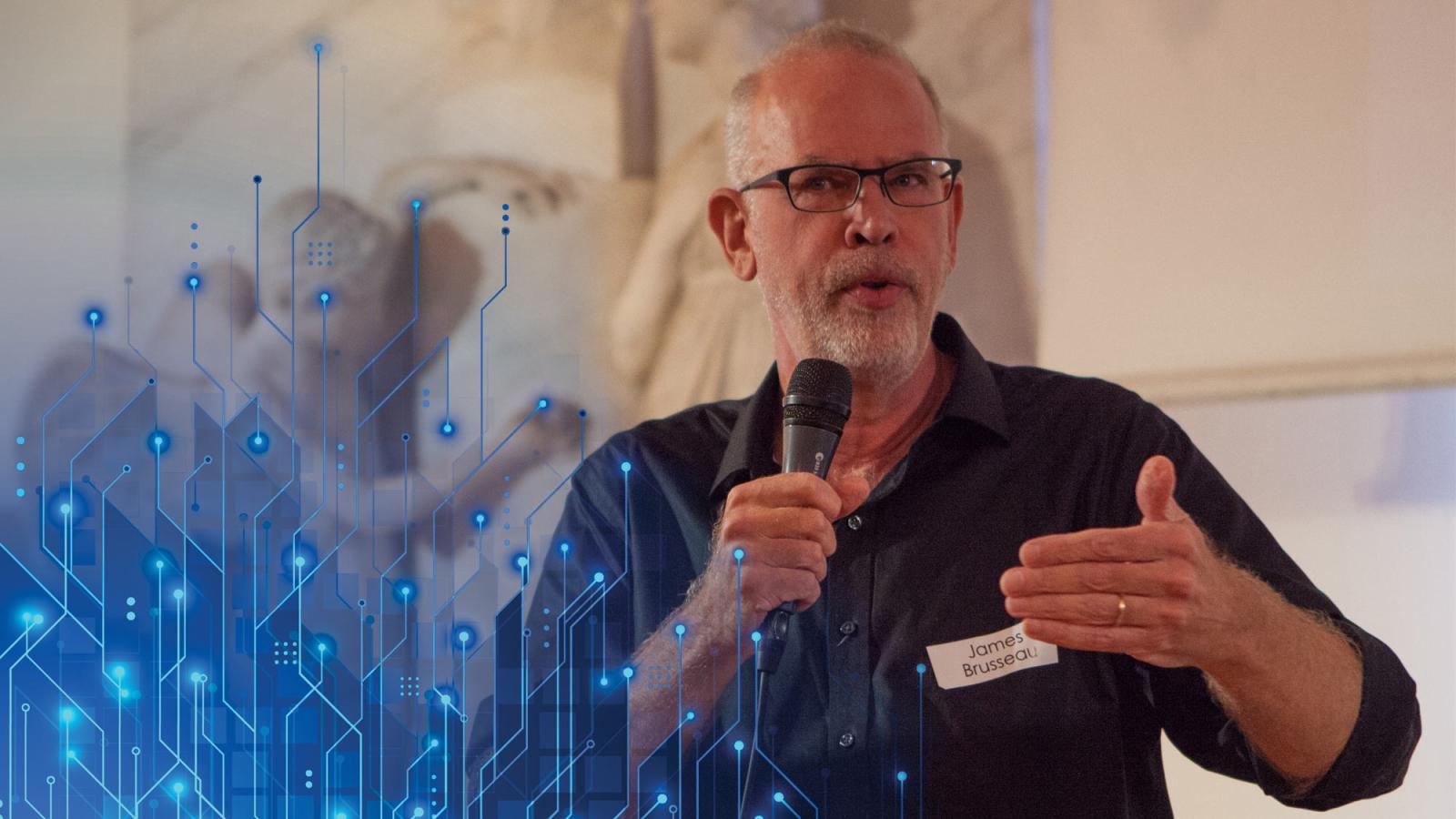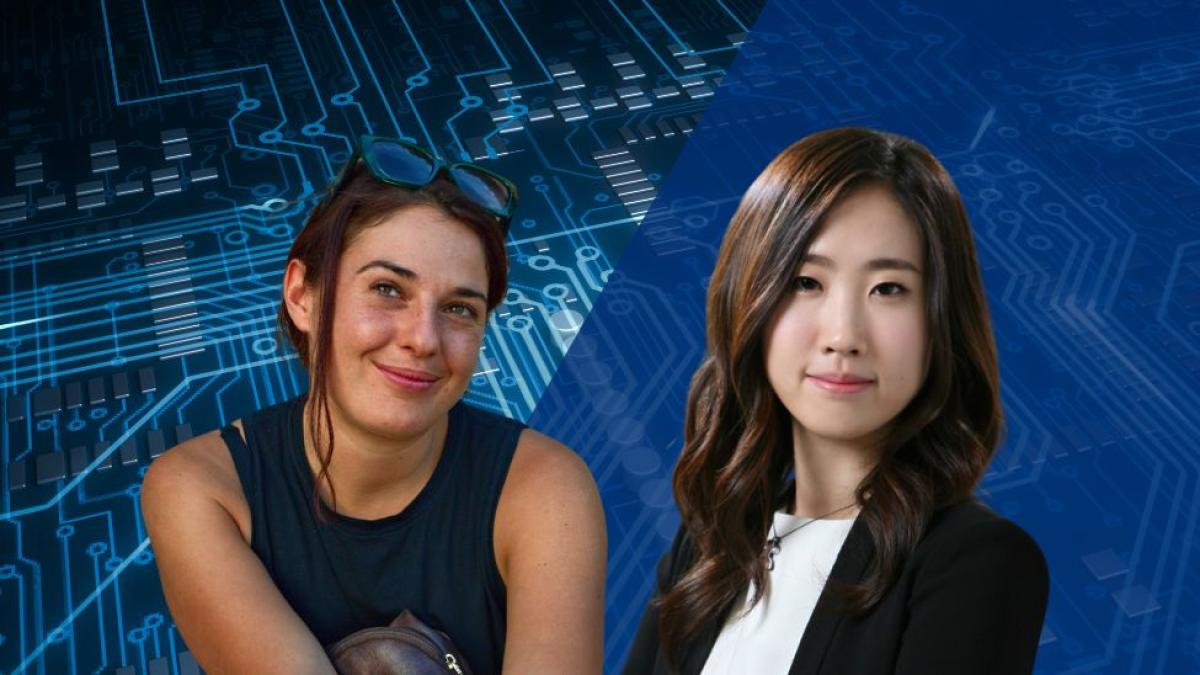Broadway stages. Global policy wins. A first-of-its-kind AI degree. Record-breaking generosity. And students leading real change—from healthcare and environmental advocacy to protecting New York’s wildlife. The Winter 2026 edition of "10 Things to Inspire You" captures just a snapshot of the momentum driving the Pace Community forward.
An Ethics Expert’s Perspective on AI and Higher Ed

As a scholar deeply immersed in both technology and philosophy, James Brusseau, PhD, has spent years unraveling the complex ethics of artificial intelligence (AI).
“As it happens, I was a physics major in college, so I've had an abiding interest in technology, but I finally decided to study philosophy,” Brusseau explains. “And I did not see much of an intersection between the scientific and my interest in philosophy until all of a sudden artificial intelligence landed in our midst with questions that are very philosophical.”
Some of these questions are heavy, with Brusseau positing an example, “If a machine acts just like a person, does it become a person?” But AI’s implications extend far beyond the theoretical, especially when it comes to the impact on education, learning, and career outcomes. What role does AI play in higher education? Is it a tool that enhances learning, or does it risk undermining it? And how do universities prepare students for an AI-driven world?
In a conversation that spans these topics, Brusseau shares his insights on the place of AI in higher education, its benefits, its risks, and what the future holds.
What is AI's place in higher education?
I do have an opinion on higher education and AI, and it's controversial, but on this matter, all opinions are controversial. I think, at this point, it's my instinct to say that AI—more than anything else—is just a tool. That is, I do not think it is capable of producing thought as you and I do.
For example, when you look at AI-generated art, there's always some little tell that it's machine-made. There'll be six fingers on a hand, or it’s too perfect, or too symmetrical. The human eye can detect when AI has created art. And I think that of course AI will constantly get better, but I think there will always be that sense that you and I will have that an artificial intelligence has created art.
I think that if AI alone is the professor, then the knowledge students get will be imperfect in the same vaguely definable way that AI art is imperfect.
And I think that that’s also true for knowledge—knowledge about philosophy, about journalism, knowledge about the kinds of things we teach at Pace. I think that if AI alone is the professor, then the knowledge students get will be imperfect in the same vaguely definable way that AI art is imperfect.
My broad opinion is that AI is just a tool. It's not actual intelligence itself. And for that reason, its effects in higher education will be somewhat limited, though I think that in a couple of ways, they’ll be very significant.
What are some of the benefits of integrating AI in learning?
AI, at least in my experience, allows us to learn about things very quickly. I mean, I just know in my professional work, I'm asking fairly specialized questions.
For example, I'm writing a paper now about art and creativity, and I was writing about an author called Walter Benjamin, who is a fairly narrowly known philosophical writer, and I asked ChatGPT a very specific question about what this author thought about a specific painting, and it gave me a good answer. And I checked a book I have on the author to make sure, and it was right.
So one thing that AI will do is provide very specific and personalized information for students and professors very quickly.
What are some of the concerns about AI in higher education?
I think that is fairly clear: It's the over-reliance on AI. I have already seen students relying on it for their work. Sometimes students forget that professors, like me, were also students once in the past. And so, they don't imagine that when I write an exam, I might give that exam to ChatGPT to see what ChatGPT says. And then when the student does the same thing, right away I can see that they have used AI, because I got almost exactly the same answer from ChatGPT.
I think that the risk of AI is that the students will become sloppy, they will become careless. They will let AI, in essence, do their work. And I think that's a legitimate downside.
How can universities and professors assess true student understanding of a topic or concept?
It’s my belief that oral exams will make a comeback. During my summer semester at the University of Trento in Italy, we had, for the first time, purely oral exams for my classes. For the midterm exam, I had the students gather into groups and do presentations on AI ethics and then for the final exam, I had each student do a presentation alone.
So one thing that AI will do is provide very specific and personalized information for students and professors very quickly.
That kind of just human interaction, I think, one, it's a very good learning experience for the student. It's hard to stand up in front of your colleagues and talk, it's a learned skill. I think that we should promote that more going forward.
But I think also, two, that's a way to discover whether or not the student actually learned and did the work. And when students know that there is an oral exam at the end, I think that will in some sense force them to do more of the learning. And I think that will help students focus learning from AI instead of letting AI do the learning for them.
What do you think will be the overall impact of AI on student learning?
I think that the big change that we're going to see from AI is not so much in how education works, but how students, more than ever, are going to be responsible for their own education. Students who want to learn a lot are going to be able to learn more, faster. However, students who are clever and really just want to get through, I think they are also going to be empowered to do that in numerous ways.
For example, part of what is discovered in the traditional research process is tangential to the initial goal. If a student wants to write about how previous scholars have understood the idea of privacy, they will need to comb through several texts and likely make some unexpected discoveries about the subject. But, with ChatGPT, they can go directly to the required information. That helps with their grade, but detracts from their intellectual curiosity.
Students, more than ever, are going to be responsible for their own education.
In education, I think we're going to see a growing level of inequality in outcomes. Some students are going to graduate with educations that are pristine, that are at levels that could not have been even reached 20 years ago, because they will have been able to use AI to research so deeply into a subject they enjoy. But I’m afraid, we are also going to see some graduates who have been able to fake it, in essence, the whole four years.
There are a lot of fears about AI taking jobs. What are your thoughts on how AI will affect career opportunities?
There will be some transformation in jobs. Jobs will change. But just my own experience tells me that there's more opportunities than losses.
Let me give you an example. Seidenberg’s Christelle Scharff and I wrote a paper about how AI can be used to help clothing designers produce new kinds of clothes. A really interesting application. I never would have thought of that. People think about AI for doing healthcare. They think about AI for making weapons and destroying the world and that kind of thing. But I never would have thought about artificial intelligence and clothing design.
So, this is a terrific opportunity for someone from Pace. We have courses on design and the arts, and we have a computer science school. That's an opportunity for someone from Pace to create a kind of job for themselves, right? So, my sense is that AI will do more of that creation than destruction. Of course, there will be destruction, but for people who are ambitious and creative, I think the opportunities are there.
Want to join the AI discussion? RSVP for the upcoming AI user groups kickoff meetings, a new initiative from the Provost's Committee on Artificial Intelligence.

